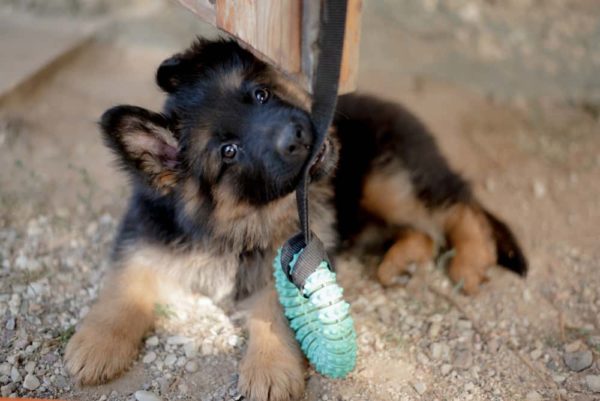Many families enjoy having German Shepherd puppies as members of their family. The German Shepherd, also known as the Alsatian puppy, was created initially for herding purposes and is now frequently used as a working dog or pet. This is your guide to giving your new puppy all the nutrients they require.
Many types of food can be provided. Puppy foods made for large breed dogs are crucial for puppies, though. This will assist in preventing health issues brought on by excessively rapid bone growth.
Discover the specifics of what’s best for your German Shepherd puppy by reading on!
Do not switch to a new food during the first few weeks if you intend to.
then over the course of two to four weeks, gradually add more of the new food.
It was discovered many years ago that large breed puppies who grow quickly experience more health issues with their bones and joints.
A diet made for large dog breeds or specifically for German Shepherds should be given to young German Shepherds.
How does diet affect the health of growing Shepherds?
It has recently been discovered that a healthy diet for puppies does more than just prevent malnutrition. There are numerous items that should never be fed to German Shepherds as part of this proper diet.
Numerous orthopedic conditions, including hip and elbow dysplasia, are strongly inherited. However, people frequently disregard how diet affects problems with bone development.
Puppy obesity and the ensuing aggravation of hip, elbow, and back issues are clearly related.
However, your German Shepherd dog need not be overweight to experience a number of health issues.
Simply producing an oversized puppy, as is frequently the case with show animals and individuals fixated on large dogs, can result in a number of excruciating conditions:
Overeating and excessive supplementation of some vitamins and minerals cause paradoxical bone malnutrition, which then impairs development.
Experts in nutrition have changed their recommendations for large-breed dogs’ diets.
To reduce the frequency and severity of developmental issues in German Shepherds and other large breed puppies, many nutritionists and veterinarians advise feeding them an adult or homemade diet that has been professionally formulated.
The idea of overnutrition in puppies has been recognized by pet food manufacturers, and the majority of them carry special diets for large-breed puppies.
Some people argue that puppies should receive additional vitamin and mineral supplements. We advise working with a professional to create a diet that limits your puppy’s growth rate and size during the first few months.
Additionally, avoid giving your puppy vitamins, minerals, or proteins without your veterinarian’s approval because doing so excessively will harm the puppy’s growth plates and interfere with the development of its bones and cartilage.
Limiting calories and slowing your puppy’s growth during the first eight months of life won’t have any impact on how big they’ll be when they’re grown.

How Should You Feed Your German Shepherd Puppy?
How much and how often to feed your new puppy are probably the two most important questions you have, so let’s go over some things to think about.
The food bag is often used as a starting point by many people when determining how much to feed their dogs. However, one of the simplest ways to overfeed your growing puppy is by reading the label on commercial food.
In order to ensure that the diet meets or exceeds NRC (Nutritional Research Council) requirements, dog food labels may increase feeding recommendations by up to 25%.
If you calculate and measure meals yourself, it will be more accurate and better for your puppy.
Feeding your puppy involves regularly evaluating and tracking their weight. By simply observing your dog, you should be able to determine whether they are nearing their ideal weight.
Weight charts are helpful tools, but they don’t take an individual’s deviations from the norms into consideration. Also, remember to factor in treats when figuring out your daily food allowances!
For instance, if you give lots of treats during training, you should compensate by adjusting meal portions to your dog’s weight or overall health.
Drake Center for Veterinary Care uses a body scoring system modified from Purina’s charts and other sources.
Puppies’ body scores will vary and they could change quickly in a matter of days. Pups often lose their abdominal tuck right after a meal.
Puppies that are under 16 weeks old frequently have a pot-bellied look and little abdominal tuck.
For the first six months of your dog’s life, be sure to have frequent checkups with a veterinarian because persistent abdominal distension may be a sign of intestinal worms.
Although it can be challenging to keep growing puppies at a certain body score, it is always preferable for them to be slightly underweight or even thin than overweight.
Dogs that are thin will have more visible ribs, a waist, and a pelvis without looking malnourished or emaciated.
Consult a doctor if your puppy eats well but doesn’t grow or put on enough weight.
German Shepherds may occasionally develop pituitary gland dwarfism or a lack of pancreatic enzyme production.

Calculating how many cups your Shepherd puppy needs per day and dividing that number by the number of feedings is the simplest way to determine how much food to give them.
Depending on how your puppy’s body condition changes from week to week, you can adjust the volume.
Regardless of weight, German Shepherds consume about four cups of food per day from the age of 16 weeks to nine months or a year.
The volume explains the young growing animal’s comparatively high calorie needs.
When your dog is nine months old, you’ll depend more on his or her weight and level of activity. Over-a-year-old German Shepherds might require five to eight cups of dog food.
Other references, however, use weight rather than age. Puppies consume one cup of food daily for every 15 to 20 pounds.
Dogs weighing more than 100 pounds are given five cups of kibble in addition to a half-cup for each additional 20 pounds.
Like all models, more active dogs require more food to maintain their level of activity, so adjust accordingly based on body scoring.
The most precise way to decide how much to feed your puppy is to calculate its caloric needs. Once you have the conversion rate, you can estimate the amount to feed your German Shepherd puppy.
Wet food cans and dry dog food bags typically list the number of calories in each cup of the product.
If you give your dog a raw or homemade diet, you must determine the number of calories in each ingredient.
Knowing the anticipated adult weight can help you determine your puppy’s ideal calorie range of needs.
Depending on how close to adult weight your Shepherd is, you should feed them a certain number of calories.
Again, calorie needs vary from person to person, so you still need to be mindful of your puppy’s changing physical condition.
Why Do You Feed Your German Shepherd Puppy?
Health and growth are the two most obvious reasons to feed your German shepherd.
FAQ
How often should you feed a German Shepherd puppy?
Feed your baby twice daily after the age of eight weeks, then three times daily. Always choose a high-quality puppy food marketed for large breeds if you want to switch the food. Up until you reach 100% new food, gradually combine the new food with the old food at a rate of 1/4 new for two days, 12 new for two days, and 34 new for two days.
How much should a puppy eat chart?
Weight of Dog6-12 Weeks8-12 Months3 – 5 lbs1 – 1 1/3 cups1/2 – 2/3 cups5 – 10 lbs1 1/3 – 2 1/2 cups2/3 – 1 cups10 – 20 lbs2 1/2 – 4 cups1 – 2 cups20 – 30 lbs4 – 5 3/4 cups2 – 2 3/4 cupsPUPPY FEEDING CHARTWeight of Dog6 – 12 Weeks8 – 12 Months
How many cups of food should I feed my German Shepherd?
In summary, for adult dogs, feeding German Shepherds about 2. 5 to 3. A good place to start is with 5 cups of high-quality kibble per day, given twice daily. Depending on your dog’s size, weight, age, and overall daily activity, adjust the amount fed as necessary.
How much should I feed my German Shepherd by weight?
What are dog feeding charts? Adult Dog Size (lbs)Dry Food Feeding Amount (Cups)26 to 502 to 2-2/351 to 752-2/3 to 3-1/376 to 1003-1/3 to 4-1/4100+4-1/4 plus 1/4 cup for every 10 lbs of body weight over 100 lbs